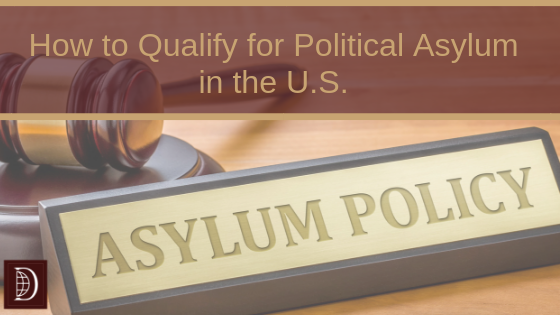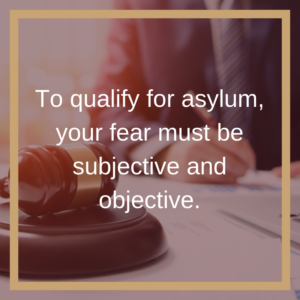
Qualifying for Political Asylum in America: Answers From a Political Asylum Attorney in Houston
How do you qualify for political asylum in America – and if you do qualify, what do you need to do to apply?
If you’re considering escaping your home country and asking for asylum in the United States, you may want to talk to a political asylum attorney in Houston who can walk you through each step of the process.
Qualifying for Political Asylum in America
You can only apply for asylum if you’re already in the U.S. or if you’ve presented yourself to an immigration official. If you are outside the U.S., you need to apply for refugee status.
You can apply for asylum regardless of your immigration status – that means that even if you are an undocumented immigrant, you can still ask the U.S. government for asylum.
Qualifying for political asylum in America requires a person to have a reasonable fear of persecution due to:
- Race
- Religion
- National origin
- Political opinion
- Membership in a group or social class
In order to qualify, the person seeking asylum must fill out paperwork and go through an interview with U.S. Citizenship and Immigration Services.
If you are granted asylum, you will be permitted to stay in the U.S. You can include your spouse and children on your application so they can stay, too.
Affirmative Asylum vs. Defensive Asylum
Affirmative asylum is a process by which an asylum-seeker enters the U.S. with a valid visa and applies for asylum through UCSIS. In this process, an immigration official with USCIS decides whether to grant asylum.
Defensive asylum is a process by which a person who is in removal proceedings asks for asylum. It’s also the process by which people can apply when they appear at a port of entry to ask for asylum. In this process, an immigration judge decides whether to grant asylum.
What is a Reasonable Fear of Persecution?
A reasonable fear of persecution refers to how likely you are to be persecuted in the future. If you’re applying for political asylum, you don’t have to prove that you’ll definitely be persecuted – under American law, you only have to show that you have a 10 to 15 percent chance of being persecuted.
In some cases, you may be able to show that you were persecuted in the past. If you have been, you probably have a reasonable fear of future persecution unless the government can prove otherwise. There are two ways the U.S. government can do that: It can say that your home country’s conditions have changed significantly and that there’s no longer a threat, or it can say that you could reasonably live in a different part of your home country and not be at risk for persecution.
Persecution Defined in the Context of Asylum
Typically, the infliction of suffering or harm, or any threat of the loss of life or liberty can be considered persecution. Torture, severe bodily harm or long-term imprisonment can, too. Harassment alone isn’t enough – but things like being put under constant surveillance, being pressured to join a group that commits crimes, or someone discriminating against you in matters such as housing, education or passport issuance can be considered persecution, as well.
However, U.S. asylum law doesn’t explicitly define persecution. That leaves USCIS officials to make determinations on an individual basis. The one thing that does remain constant, though, is that the persecution (or the threat of persecution) must be due to your race, religion, national origin, political opinion or membership in a group.
You must demonstrate that you’re under threat of persecution from your home country’s government or by people the government can’t – or won’t – control. That could refer to roving gangs that the government is unable to stop, mercenaries, terror organizations or government officials; it can also refer to criminal organizations and a number of other factions, as well.
According to the United Nations, reasonable fear occurs when you have at least a 10 percent chance of persecution in your home country.
Examples of Fear in Qualifying for Asylum
To qualify for asylum, your fear must be subjective and objective.
Subjective fear means that you honestly fear that if you do return to your home country, you’ll be persecuted.
Objective fear means that you can show evidence or demonstrate facts that show any reasonable person in the same situation would fear persecution.
If your home country has a policy of handing down death sentences for homosexuality, and you’re a homosexual, you can use that to demonstrate objective fear. If officials in your country marginalize and punish people of your religious group simply for existing, or if your country uses coercive family planning, forced institutionalization or drug injections against certain parts of its population, you could have grounds to apply for asylum based on your objective fear.
You should talk to a political asylum attorney in Houston about your reasons for seeking asylum. With his or her help, you’ll be able to determine whether you qualify for asylum and begin the process of applying for it.
The Difference Between Asylees & Refugees
[youtube https://www.youtube.com/watch?v=s-J1nLsxTiM]
Do Your Spouse and Children Automatically Qualify for Asylum if You Do?
Your spouse and kids don’t always automatically qualify for asylum if you do – you must ask to have your spouse and kids (as long as your children are under 21 and unmarried) included in your asylum decision. If you are granted asylum, your spouse and kids will also be granted asylum as long as they aren’t barred from it.
It’s important that you know that kids under 21 are covered under the Child Status Protection Act. If one of your children turns 21 after you’ve filed your application but before you’ve received a decision, he or she is still considered a “derivative” and doesn’t have to file on his or her own.
If your kids are already married or if they’re over the age of 21 when you file your asylum application, they must apply for asylum on their own.
Do You Qualify to Work in the U.S. if You Get Asylum?
If you’re granted asylum, you can start working immediately. You don’t have to apply for any employment authorization documents, but you can if you’d like to. Employment authorization is not necessary.
Applying for Employment Authorization
While you’re waiting for an asylum decision, you may find it necessary to work – but the only way you can do that before you’re granted asylum is through Employment Authorization documents. However, you can’t apply for employment authorization (permission to work) at the same time you file your asylum application. You can only apply if 150 days have passed since you filed your completed application (excluding any delays you caused, such as asking to reschedule your interview) and you haven’t received a decision yet.
An Important Note for Undocumented Asylum-Seekers in the U.S.
If you’re referred to the immigration court because you’re in the U.S. illegally, your spouse and children will be referred to court for deportation proceedings if they’re aren’t in a legal status. You can all still file for asylum, regardless of your immigration status, but you need to know that if you’re here without the proper documentation, your asylum hearing will go through the immigration court. In cases such as these, we advise you to contact an immigration attorney as soon as possible.
What Are Bars to Asylum?
Many things that would cause other immigrants to be deported or denied entry into the U.S. (like entering the U.S. illegally) don’t apply to people who are seeking asylum. However, when you call or visit your political asylum attorney in Houston, he or she will discuss bars to asylum.
Bars to asylum are conditions that will prevent you from being eligible to take refuge in the U.S. You can be barred from asylum if you:
- Ordered, incited, helped or participated in persecution of other people based on race, religion, nationality, political opinion or membership in a particular social group – the same reasons you’re using to ask for asylum in the U.S.
- Were convicted of a serious crime, such as an aggravated felony.
- Committed a serious, non-political crime outside the U.S.
- Are dangerous to U.S. security.
- Were resettled in another country before you came to the U.S.
- Had a previous asylum application denied by an immigration court.
- Meet terrorism or other security-related inadmissibility grounds.
Some bars will prevent you from ever getting asylum, such as conviction of an aggravated felony or support of a terrorist group. You can overcome some bars, though, like having the opportunity to live permanently in another country before you arrived in the U.S. or having a previous asylum application denied.
What a Political Asylum Attorney in Houston Can Do for You
When you work with a political asylum attorney in Houston, you’ll be able to get answers to all your questions. Although the laws remain the same, every case is different – even USCIS officials determine who qualifies for asylum on a case-by-case basis.
Your lawyer will complete your application for asylum and help you prepare for your interview. He or she can also go with you to the interview so you’re not alone, as well as represent you if you have to appear in immigration court.
If you need to apply for refuge in the U.S., it’s a good idea to talk to a political asylum attorney in Houston who can answer your questions and help you start moving forward. Call or schedule a free consultation online with an immigration lawyer today to get the advice you need now.
About Davis & Associates:
Davis & Associates is the immigration law firm of choice in Houston and surrounding areas. Their attorneys provide expert legal counsel for all aspects of immigration law, including deportation defense, writs of habeas corpus and mandamus, family-sponsored immigration, employment-sponsored immigration, investment immigration, employer compliance, temporary visas for work and college, permanent residence, naturalization, consular visa processing, waivers, and appeals. Attorney Garry L. Davis is Board Certified in Immigration and Nationality Law by the Texas Board of Legal Specialization.
Contact Info:
Davis & Associates
Address: 654 North Sam Houston Pkwy E #100, Houston, TX 77060
Phone: (832) 742-0444
